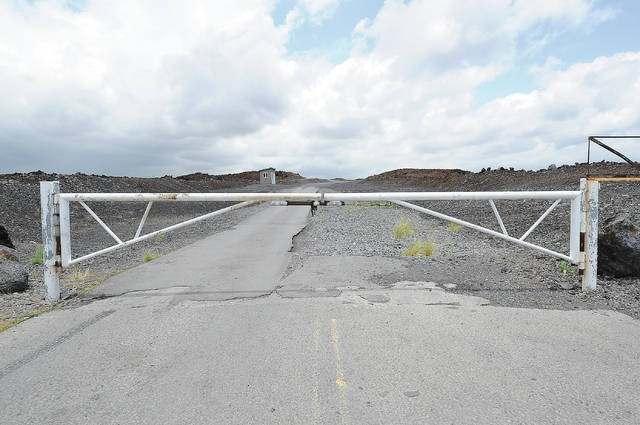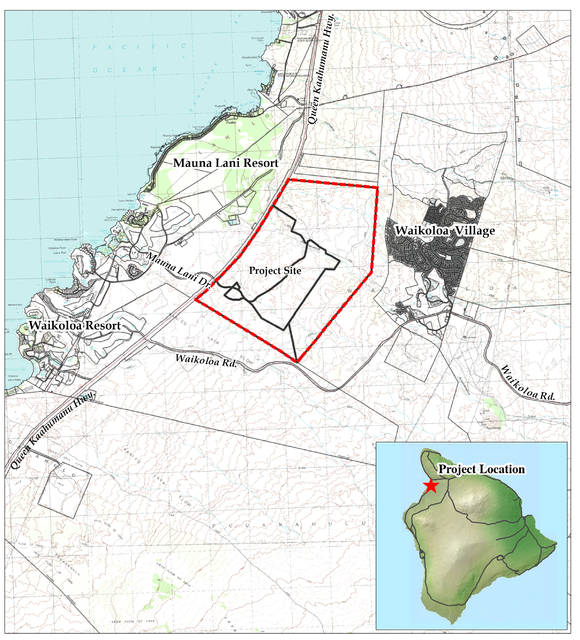KAILUA-KONA — Trial gets underway this week in the case of a South Kohala developer seeking tens of millions of dollars from the state for damages it says were incurred as the result of a 2011 Land Use Commission decision that was ultimately overturned.
The federal takings case is headed for jury trial on Tuesday after a settlement payout agreement between the state and developer Bridge Aina Lea fell through last year.
The developer and state had agreed to the state paying $1 million to settle the case rather than go to trial; however, legislators cut out the money in the final 2017 appropriations bill that was signed by Gov. David Ige.
Bridge Aina Lea, one of the developers of 3,000-acre The Villages at Aina Lea, says in its suit that the commission’s decision seven years ago to revert zoning on a 1,060-acre tract to its original classification of agricultural from urban was a constitutional taking of Bridge’s property without just compensation because of the loss of the use of the land after it had already invested millions of dollars into the project.
The developer says damages incurred from the decision — which was ultimately overturned in the courts — were not less than $37.5 million.
Attorneys for Bridge Aina Lea and the Attorney General’s office on Tuesday will appear before Judge Susan Oki Mollway in U.S. District Court in Honolulu for jury selection and opening statements in the case.
In addition to the multimillion-dollar figure named in the court filing, Bridge Aina Lea also wants four additional orders: a temporary restraining order preventing the commission from taking additional action regarding the land, a permanent injunction from reclassifying the land, an order declaring the commission’s decision to reclassify the land was “egregious, illegal, invalid, unconstitutional, arbitrary, capricious” and an order stopping the commission from interfering with “Bridge’s rights to develop the property.”
The takings case dates back to January 2011 when the Land Use Commission (LUC) ordered the 1,060 acres reverted to its original classification, agricultural district, after determining Bridge Aina Lea hadn’t met conditions of a zoning change, including that by November 2010, 385 affordable units be complete, among other. By that time, just 16 units were finished on the otherwise empty land in South Kohala.
That same year, a 3rd Circuit Court judge reversed the commission’s order, ruling it didn’t have the authority to impose the strict construction timeline conditions and to reclassify the land as agricultural. The judge determined the action violated the developer’s constitutional rights to due process and equal protection when it reverted the land.
A subsequent review of the ruling by the state Supreme Court in 2014 affirmed the lower court’s ruling, noting the land owners had “substantially” commenced use of the land, having spent more than $20 million by 2010.
The court disagreed, however, with the lower court’s ruling that the LUC violated the developer’s constitutional rights to due process and equal protection when it reverted the land, a finding that could have an impact on the current trial.
That’s because a separate, but similar, takings case filed by another property stakeholder, DW Aina Lea, now Aina Lea Inc., against the state in February 2017 claimed the LUC’s 2011 reversion of zoning on the urban tract was a constitutional taking of its property without compensation. But it was dismissed in June 2017. Mollway also heard that case and determined the suit was brought too late.
Currently, the 3,000-acre site situated mauka of Queen Kaahumanu Highway north of Mauna Lani Resort is split between Aina Lea Inc. and Bridge Aina Lea.
Bridge Aina Lea, based in Saipan, owns a 1,927-acre area classified agriculture and Aina Lea Inc., based in Waikoloa, owns 1,072 acres, including the 1,060 acres that are the subject of the current federal takings claim trial. Aina Lea Inc. acquired 1,011 acres of the urban-classified acreage from Bridge Aina Lea in 2015.
Reached Friday, Bruce Voss, representing Bridge Aina Lea, declined comment on the case. State of Hawaii Acting Attorney General Russell Suzuki’s office did not respond to a request for comment as of press time.


